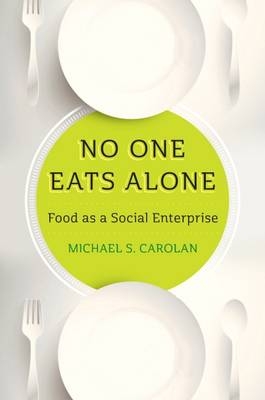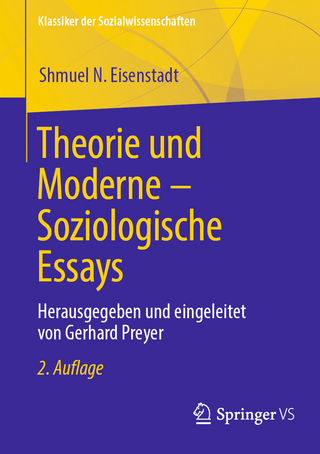
No One Eats Alone
Food as a Social Enterprise
Seiten
2017
Island Press (Verlag)
978-1-61091-804-6 (ISBN)
Island Press (Verlag)
978-1-61091-804-6 (ISBN)
No One Eats Alone is a new way of looking at our food system that emphasises the human relationships behind our food and becoming better food citizens.
In today's fast-paced, fast food world, everyone seems to be eating alone, all the time, whether it's at their desks or in the car. Even those who find time for a family meal are cut off from the people who grew, harvested, distributed, marketed, and sold the foods on their table. Few ever break bread with anyone outside their own socioeconomic group. So why does Michael Carolan say that that no one eats alone? Because all of us are affected by the other people in our vast foodscape. We can no longer afford to ignore these human connections as we struggle with dire problems like hunger, obesity, toxic pesticides, antibiotic resistance, depressed rural economies, and low-wage labour. Carolan argues that building community is the key to healthy, equitable, and sustainable food. While researching No One Eats Alone, he interviewed more than 250 individuals, from flavourists to Fortune 500 executives, politicians to feedlot managers, low-income families to crop scientists, who play a role in the life of food.Advertising consultants told him of efforts to distance eaters and producers, most food firms don't want their customers thinking about farm labourers or the people living downstream of processing plants.
But he also found stories of people getting together to change their relationship to food and to each other. There are community farms where suburban moms and immigrant families work side by side, reducing social distance as much as food miles. There are entrepreneurs with little capital or credit who are setting up online exchanges to share kitchen space, upending conventional notions of the economy of scale. There are parents and school board members who are working together to improve cafeteria food rather than relying on soda taxes to combat childhood obesity. Carolan contends that real change only happens when we start acting like citizens first and consumers second. No One Eats Alone is a book about becoming better food citizens.
In today's fast-paced, fast food world, everyone seems to be eating alone, all the time, whether it's at their desks or in the car. Even those who find time for a family meal are cut off from the people who grew, harvested, distributed, marketed, and sold the foods on their table. Few ever break bread with anyone outside their own socioeconomic group. So why does Michael Carolan say that that no one eats alone? Because all of us are affected by the other people in our vast foodscape. We can no longer afford to ignore these human connections as we struggle with dire problems like hunger, obesity, toxic pesticides, antibiotic resistance, depressed rural economies, and low-wage labour. Carolan argues that building community is the key to healthy, equitable, and sustainable food. While researching No One Eats Alone, he interviewed more than 250 individuals, from flavourists to Fortune 500 executives, politicians to feedlot managers, low-income families to crop scientists, who play a role in the life of food.Advertising consultants told him of efforts to distance eaters and producers, most food firms don't want their customers thinking about farm labourers or the people living downstream of processing plants.
But he also found stories of people getting together to change their relationship to food and to each other. There are community farms where suburban moms and immigrant families work side by side, reducing social distance as much as food miles. There are entrepreneurs with little capital or credit who are setting up online exchanges to share kitchen space, upending conventional notions of the economy of scale. There are parents and school board members who are working together to improve cafeteria food rather than relying on soda taxes to combat childhood obesity. Carolan contends that real change only happens when we start acting like citizens first and consumers second. No One Eats Alone is a book about becoming better food citizens.
Michael Carolan is a Professor Sociology and Associate Dean for Research for the College of Liberal Arts at Colorado State University. He is the author of The Real Cost of Cheap Food; The Sociology of Food and Agriculture; Reclaiming Food Security; and Cheaponomics: The High Cost of Low Prices, among other books. Dr. Carolan is also co-editor for the Journal of Rural Studies and has published more than 100 peer- reviewed articles and chapters.
| Erscheinungsdatum | 05.04.2017 |
|---|---|
| Zusatzinfo | 3 illustrations |
| Verlagsort | Washington |
| Sprache | englisch |
| Maße | 152 x 229 mm |
| Gewicht | 386 g |
| Themenwelt | Sozialwissenschaften ► Soziologie ► Allgemeine Soziologie |
| ISBN-10 | 1-61091-804-5 / 1610918045 |
| ISBN-13 | 978-1-61091-804-6 / 9781610918046 |
| Zustand | Neuware |
| Informationen gemäß Produktsicherheitsverordnung (GPSR) | |
| Haben Sie eine Frage zum Produkt? |
Mehr entdecken
aus dem Bereich
aus dem Bereich
Buch | Hardcover (2023)
Springer Fachmedien Wiesbaden GmbH (Verlag)
CHF 195,95
herausgegeben und eingeleitet von Gerhard Preyer
Buch | Softcover (2023)
Springer VS (Verlag)
CHF 69,95


